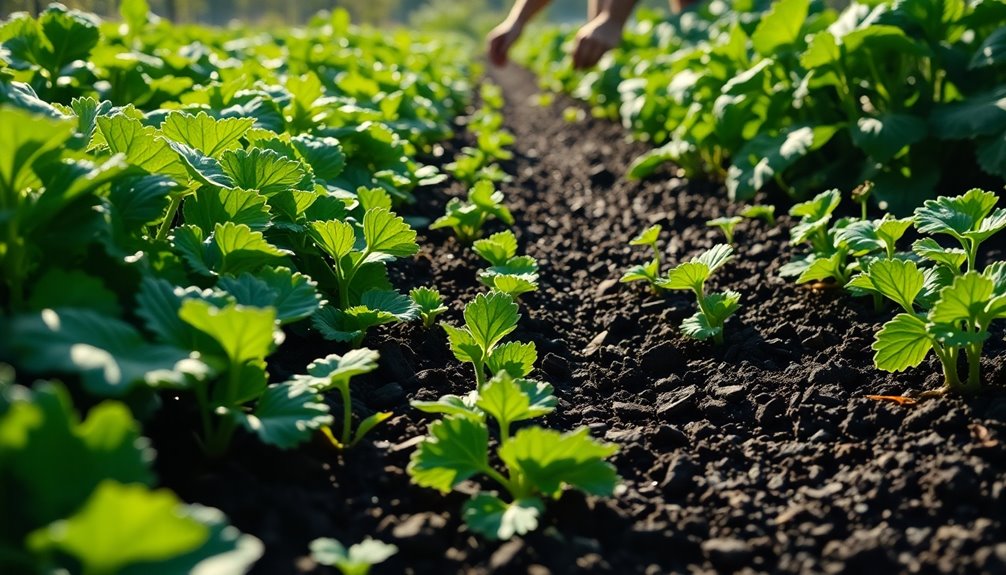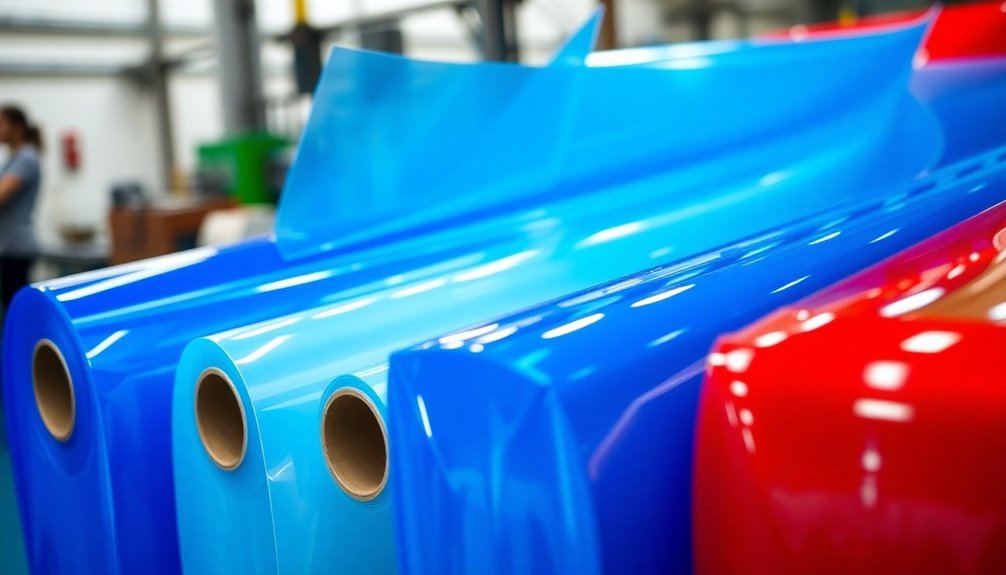Gardeners are raving about mulch film because it transforms the way you grow plants. This eco-friendly solution helps you reduce plastic waste while enhancing soil health and structure. It keeps moisture locked in, cutting evaporation by up to 50% and lowering your irrigation needs. Plus, it effectively blocks weeds, saving you time and promoting healthier plants. By raising soil temperatures, mulch film boosts seed germination and yields. It's a game-changer for sustainable gardening practices. Curious about how to effectively incorporate it into your garden? There's so much more to explore on this innovative gardening solution!
Key Takeaways
- Gardeners appreciate mulch films for their ability to significantly reduce plastic waste and support eco-friendly gardening practices.
- These films enhance soil moisture retention, decreasing irrigation needs and improving water efficiency by up to 30%.
- Mulch films effectively suppress weeds, allowing crops to grow vigorously without competition for nutrients and moisture.
- They can increase soil temperatures, promoting faster seed germination and boosting crop yields by 20% to 30%.
- Regular use of mulch films, combined with drip irrigation, fosters sustainable gardening and improves overall plant health.
Gardening's Latest Eco-Friendly Trend
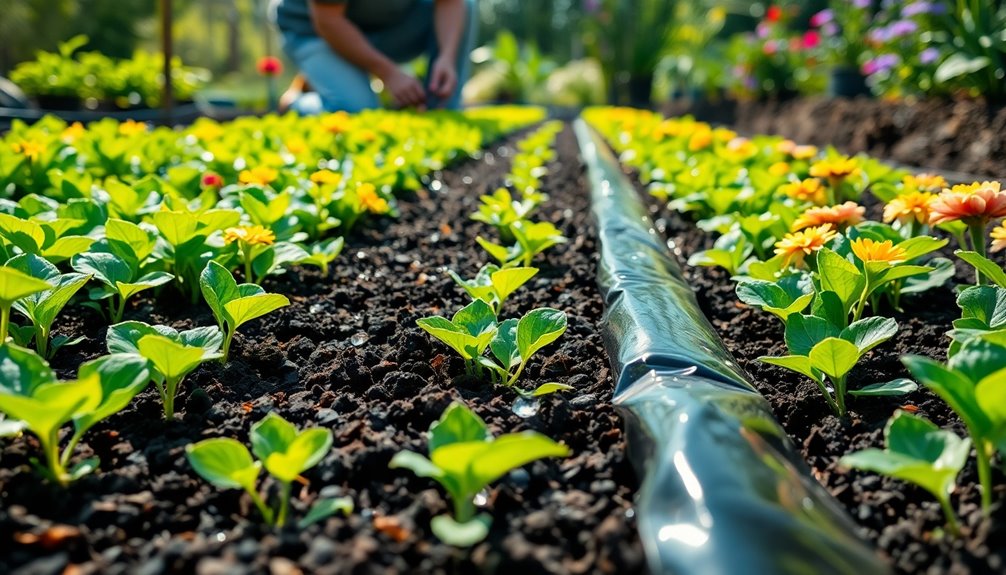
Gardening enthusiasts are increasingly turning to mulch films as a practical solution for maintaining healthy gardens while being kind to the planet. These eco-friendly options, particularly biodegradable mulch films, offer effective weed control and decompose naturally, helping reduce plastic waste. As a gardener, you'll appreciate how these films help retain soil moisture, significantly cutting down on your watering needs—especially valuable during drought conditions. Additionally, using mulch films can complement the benefits of best waterless planters, which are designed to retain moisture without constant watering.
Moreover, the use of mulch films aligns with the principles of environmental sustainability, encouraging responsible practices that promote soil health and reduce reliance on non-renewable resources. You'll notice the variety of color options available, like black and clear, which allow you to manipulate soil temperature and create optimal growing conditions. This can lead to improved soil health and crop productivity, with some studies showing yield increases of up to 30%. Furthermore, adopting these practices can enhance the effectiveness of best lawn fertilizers, which provide essential nutrients for plant growth. Additionally, the use of analytics cookies can provide insights into gardening practices by tracking their effectiveness over time.
As awareness of sustainability grows, the market for these eco-friendly mulch films continues to expand. Innovations in materials focus on balancing agricultural efficiency with environmental impact, making these films a popular choice among gardeners. By choosing mulch films, you're not just enhancing your garden; you're also contributing to a more sustainable future. So, if you're looking to improve your gardening practices, consider making the switch to mulch films for a healthier and more productive garden.
Mulch Film's Environmental Benefits
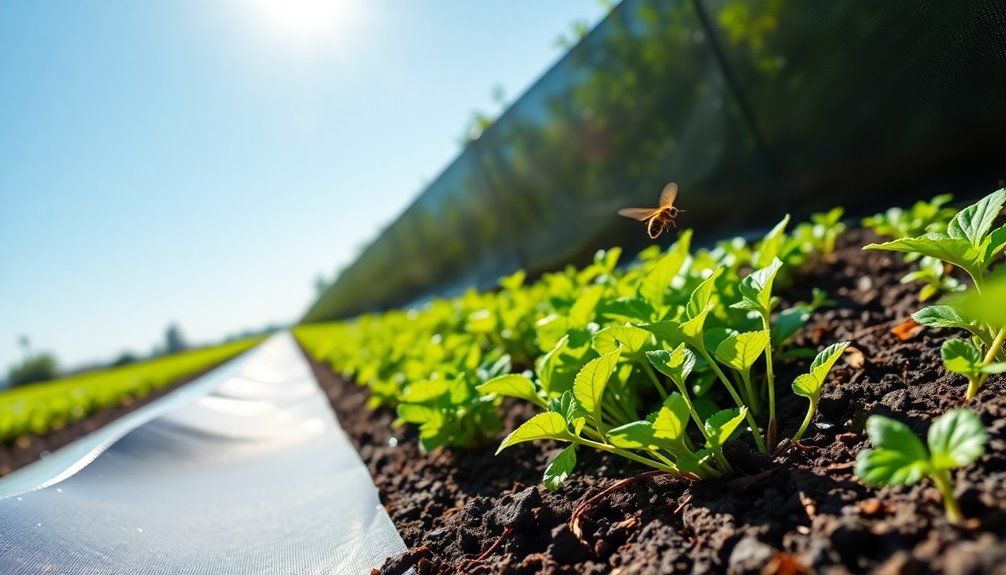
The environmental benefits of mulch films are becoming increasingly clear, especially as gardeners seek sustainable solutions. You'll appreciate how mulch films, particularly biodegradable options, significantly reduce plastic waste. By decomposing naturally, they help mitigate the environmental impact of traditional plastic mulch films.
These films enhance moisture conservation in your soil, reducing the need for excessive irrigation and conserving precious water resources. Plus, by effectively suppressing weed growth, mulch films lessen your reliance on chemical herbicides, promoting a healthier ecosystem and minimizing chemical runoff into nearby environments.
Using mulch films can also improve soil health and structure. They prevent soil erosion while maintaining optimal soil temperature, which boosts biodiversity and microbial activity in the soil. This is crucial for maintaining a balanced ecosystem that supports healthy plant growth.
Adopting eco-friendly mulch films aligns seamlessly with sustainable agricultural practices. You'll find that they promote a balance between crop yield and environmental conservation efforts, allowing you to garden responsibly while still achieving great results. By choosing mulch films, you're not just gardening; you're making a positive impact on the environment.
Mulch Film for Moisture Retention
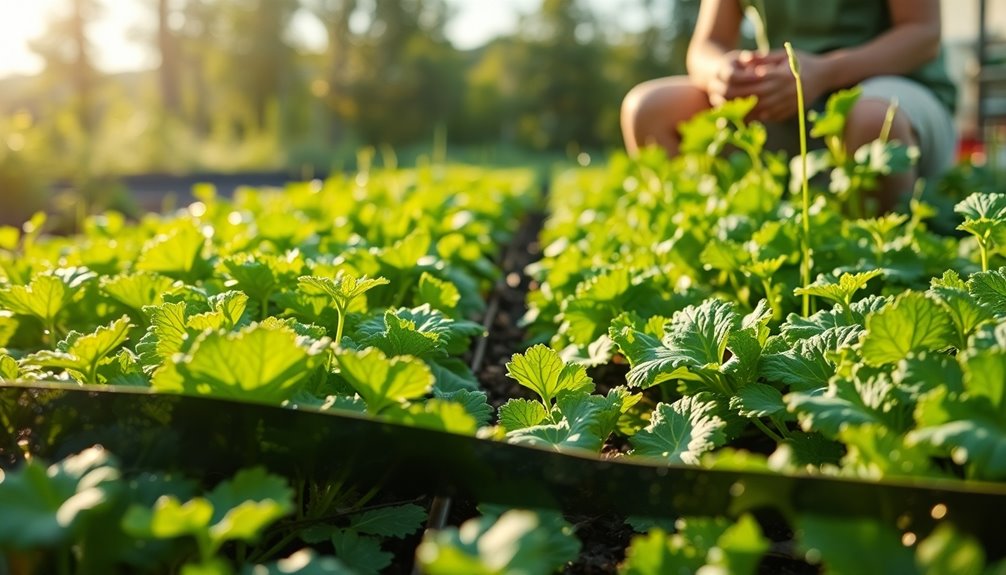
Mulch films not only offer environmental benefits but also play a key role in moisture retention for your plants. By significantly reducing soil moisture evaporation, mulch film can increase retention by up to 50% compared to bare soil. This is particularly beneficial during drought conditions, as it helps maintain consistent moisture levels essential for healthy plant roots and improved crop yield.
Using black plastic mulch film can further enhance moisture retention, as it elevates soil temperatures by 2 to 4 degrees Fahrenheit, promoting seed germination. In your gardening efforts, you'll find that mulch film reduces the need for irrigation by as much as 30%, conserving water resources while still nurturing your plants.
Moreover, mulch film effectively suppresses weeds, allowing your crops to thrive without competition for moisture and nutrients. In vegetable gardening, implementing mulch film has been linked to a 20% to 30% increase in crop yield due to better moisture management. With its ability to retain moisture and improve overall gardening conditions, mulch film proves to be a valuable tool in your quest for a flourishing garden.
Environmental Impact Considerations

Many gardeners and farmers are increasingly aware of the environmental impact of their practices, especially when it comes to mulch films. The shift towards biodegradable mulch is significant, as these films decompose naturally, greatly reducing plastic pollution compared to traditional plastic options that linger for hundreds of years. While plastic mulch films can boost agricultural efficiency and control weeds, their non-biodegradable nature raises serious concerns about soil and marine pollution.
Current research focuses on creating sustainable mulch film alternatives made from renewable resources like starch or cellulose. These eco-friendly options not only minimize greenhouse gas emissions during production and disposal but also support sustainable practices in gardening and farming. By integrating biodegradable mulch, you can enhance soil health and reduce reliance on chemical herbicides, paving the way for more responsible weed management.
Choosing biodegradable mulch isn't just a win for your garden; it's a step towards greener agricultural practices. By being mindful of your mulch film choices, you contribute to a healthier environment, combat plastic pollution, and support the future of sustainable farming.
Successful Mulch Film Applications
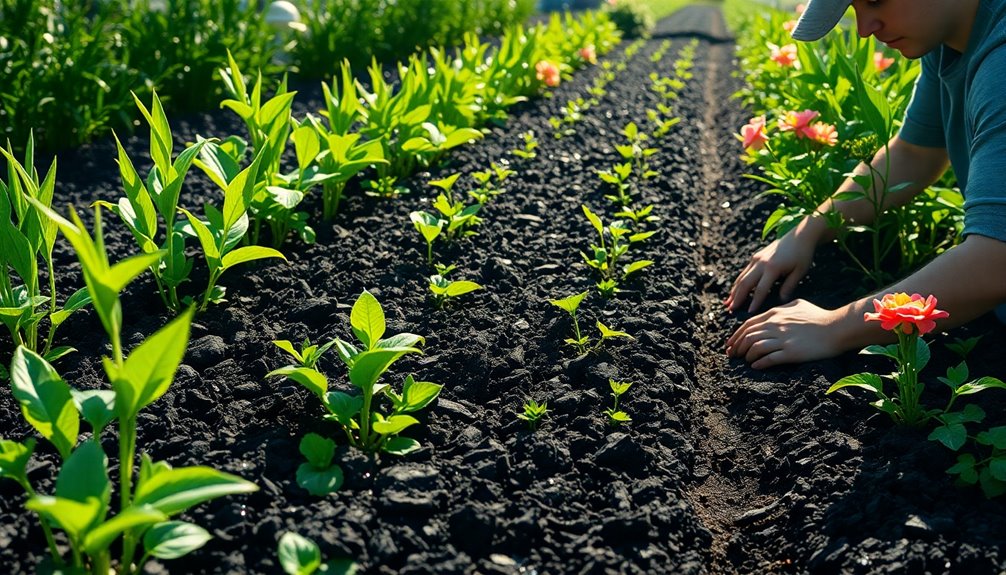
Often, successful applications of mulch film can transform your gardening or farming experience. By using mulch, you can significantly reduce your weeding time—some gardeners report cutting their weekly weeding from hours to under one hour! Plastic mulch films, especially black ones, suppress weed growth while enhancing soil temperature, leading to better seed germination and improved crop yields.
If you're looking for an eco-friendly option, biodegradable mulch films are gaining popularity. These films decompose naturally, providing effective moisture retention and weed suppression without harming the environment. Pairing mulch film with drip irrigation systems is another smart move; this combination optimizes water use, ensuring your plants receive adequate moisture while minimizing evaporation losses.
To maintain the effectiveness of your mulch film, regular inspections for damage are key. Timely removal post-growing season helps maintain soil health and prevents pest issues, allowing you to get the most out of your garden. With the right mulch film application, you'll find that managing your garden becomes simpler and more productive, providing you with thriving crops and a successful gardening experience.
Innovative Gardening Solution Unveiled
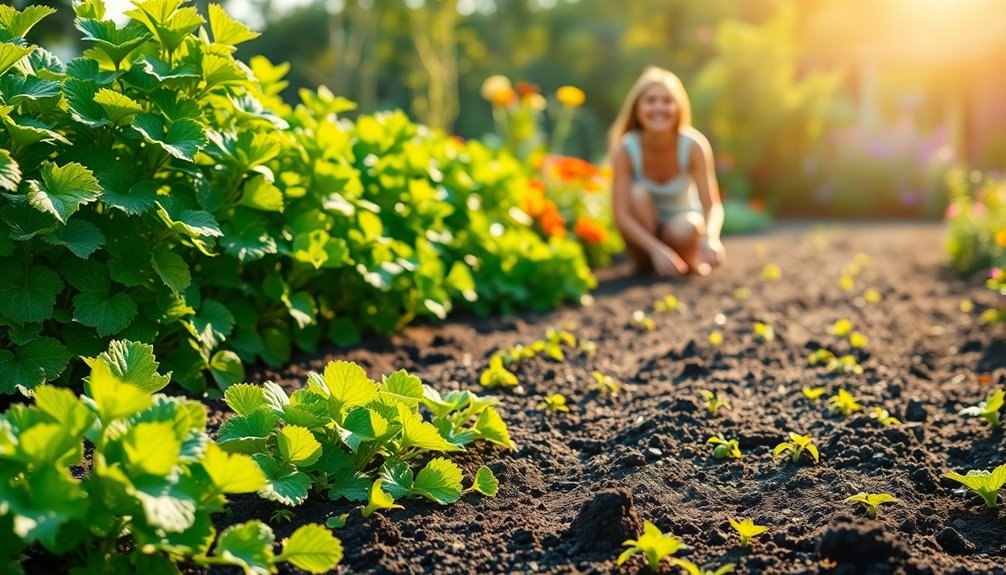
In the world of modern gardening, innovative solutions are transforming how we cultivate our plants. One such solution, mulch film, has become a game-changer for enhancing growing conditions. By improving moisture retention, regulating temperature, and suppressing weeds, it can significantly boost crop yields.
You can choose from various types of mulch film, with black films effectively blocking sunlight to suppress weeds, while clear films warm the soil for early plant growth. If you're looking for an eco-friendly alternative, biodegradable mulch has emerged as a great option, decomposing naturally and reducing plastic waste without sacrificing benefits for soil health and weed management.
Integrating mulch film with drip irrigation systems enhances your water efficiency, minimizing evaporation and ensuring your plants receive adequate moisture, especially during drought conditions. Additionally, by regularly maintaining and rotating your mulch film application areas, you can improve soil health and prevent the buildup of pests and diseases, making this a sustainable gardening practice. With these innovative gardening practices, you're not just growing plants; you're fostering a healthier environment for them to thrive.
Frequently Asked Questions
What Is the Point of Mulch?
The point of mulch is to create a healthier garden environment. It blocks sunlight, preventing weed growth, which means you'll spend less time weeding. Mulch also retains soil moisture, reducing how often you need to water your plants, especially during dry spells. It regulates soil temperature, promoting better seed germination. Plus, as it decomposes, it enriches the soil, improving fertility and structure for stronger, more productive plants over time.
What Is the Purpose of Mulch Film?
The purpose of mulch film is to enhance soil conditions around your plants. It helps retain moisture, suppresses weeds by blocking sunlight, and reduces the need for herbicides. Depending on the type you choose, mulch film can regulate soil temperature—black films keep it cooler, while clear films warm it up. Plus, using biodegradable options can minimize plastic waste, making your gardening practices more eco-friendly while promoting healthier, more productive plants.
What Does Monty Don Use for Mulch?
Monty Don uses a variety of organic materials for mulch in his garden, emphasizing the benefits of compost, well-rotted manure, and leaf mold. These options enhance soil health, improve moisture retention, and promote biodiversity. You'll find him advocating for wood chips and straw as effective weed suppressants that also provide nutrients as they break down. By applying a thick layer of mulch, you can effectively combat weeds and maintain moisture in your soil.
Why Does Mulch Attract Bugs?
Mulch attracts bugs because it creates a moist, sheltered environment that insects love. You'll find beneficial ones, like earthworms, alongside pests such as slugs and beetles. Organic mulches decompose, releasing nutrients and providing food sources, which draws in various insects. Also, the healthier your plants become due to mulch, the more insects are likely to visit. Regularly monitoring your mulched areas helps maintain a balance between beneficial bugs and pests.

